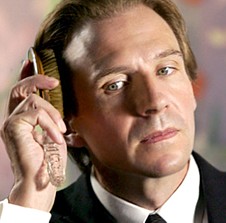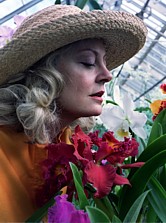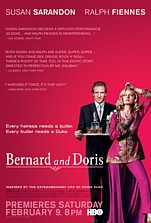
"Knight Thoughts" - exclusive web content
Susan Sarandon as tobacco heiress Doris Duke, Ralph Fiennes as Bernard Lafferty her gay, alcoholic butler in director Bob
Balaban's portrait of an odd couple, Bernard and Doris
Balaban's portrait of an odd couple, Bernard and Doris
The Odd Couple:
Bernard and Doris
2-8-08 "Knight Thoughts" web exclusive review
By Richard Knight, Jr.
Bernard and Doris
2-8-08 "Knight Thoughts" web exclusive review
By Richard Knight, Jr.
Before watching director Bob Balaban's Bernard and Doris, which has just debuted on HBO, my familiarity with the last years of
tobacco heiress Doris Duke and her gay, alcoholic butler Bernard Lafferty came via the 1999 TV mini-series Too Rich: The Secret Life of
Doris Duke that starred Lauren Bacall and Richard Chamberlain in the same roles. The Bacall-Chamberlain version portrayed Duke
as a drug addled harridan at the mercy of Lafferty as her rapacious, controlling butler who fired staff members willy nilly and got her
to sign a new will naming himself her executor amongst a host of other suspicious actions. But in the Balaban film, with a script by
Hugh Costello, the relationship is seemingly much more benign, much more a chance meeting of two loners who come to find
comfort and trust in each other's eccentricities.
The result isn't nearly as juicy but as Balaban noted in an interview with me, no one knows the exact story of what went on with these
two. To that end, his film begins by announcing that portions are true and portions are fable. Though the Bacall-Chamberlain
mini-series is wildly entertaining (and also has the enhancement of detailing Duke's earlier life including her mega hot affair with a
black man played by Brian Stokes Mitchell), Balaban's thoughtful approach turns out to be equally satisfying, albeit one that leaves
a very different impression.
Sarandon's Duke still acts the diva, still has her black studs around to quell her reported enormous physical desires and Fiennes'
Lafferty still has the insecure, odd duck quirks. But instead of tempestuous fights, drunken outbursts and other salacious moments,
we get a detailed character study that de-emphasizes the narcissistic rich old lady taken in by the scheming toady stuff and allows
the actors to flesh out their unique characters. Duke's love of orchid growing, an apt metaphor for a life lived in a fishbowl of
attention, is a focal point and it's a breakthrough for the friendship as well when Lafferty comes to share her love of working in the
hothouse. Alternately, Duke's closeness to Lafferty, after he's tactfully declined a pass pointing out his homosexuality, is shown to
have taken hold when she looks the other way when he vividly falls off the wagon. Duke, no stranger to drunken behavior, in
Balaban's view, seems to have found a compatriot. Later, by finally insisting that Bernard go ahead and put on make-up and dress
up in drag to serve dinner if that's what makes him feel comfortable, Doris signals her complete trust and compassion for her friend.
Upon her death Duke left Lafferty $5 million (an amount she handed out many times to friends, strangers and institutions during
her lifetime) and made him Executor of her vast estate. But we don't see that the money or control brought Lafferty a modicum of
pleasure (the Bacall-Chamberlain version goes the other direction). What Balaban gives us finally, is a study of two outsiders
trapped by their circumstances, who had the rare luck of finding each other. As expected, one comes away from his film with a
different point of view. In the hands of Sarandon and Fiennes, a offbeat melding of actors whose emotional temperatures are
usually fire and ice, we get the sense of two individuals who have trouble connecting with anyone for long but who instinctively know
somehow that salvation lies in the other. They're an odd couple to spend the course of a movie with as, even though both are
sympathetic in the end, neither is particularly likeable. The Bernard Lafferty and Doris Duke we meet in Bernard and Doris make us
feel for the poor little rich girl and also the poor little poor boy - a neat trick. But in the end, we don't really want to spend much
time with either - something Balaban and the actors seem to subconsciously acknowledge throughout the movie. This in itself, given
the gossipy potential of the material, is an interesting approach to say the least and a road not many filmmakers would take.
tobacco heiress Doris Duke and her gay, alcoholic butler Bernard Lafferty came via the 1999 TV mini-series Too Rich: The Secret Life of
Doris Duke that starred Lauren Bacall and Richard Chamberlain in the same roles. The Bacall-Chamberlain version portrayed Duke
as a drug addled harridan at the mercy of Lafferty as her rapacious, controlling butler who fired staff members willy nilly and got her
to sign a new will naming himself her executor amongst a host of other suspicious actions. But in the Balaban film, with a script by
Hugh Costello, the relationship is seemingly much more benign, much more a chance meeting of two loners who come to find
comfort and trust in each other's eccentricities.
The result isn't nearly as juicy but as Balaban noted in an interview with me, no one knows the exact story of what went on with these
two. To that end, his film begins by announcing that portions are true and portions are fable. Though the Bacall-Chamberlain
mini-series is wildly entertaining (and also has the enhancement of detailing Duke's earlier life including her mega hot affair with a
black man played by Brian Stokes Mitchell), Balaban's thoughtful approach turns out to be equally satisfying, albeit one that leaves
a very different impression.
Sarandon's Duke still acts the diva, still has her black studs around to quell her reported enormous physical desires and Fiennes'
Lafferty still has the insecure, odd duck quirks. But instead of tempestuous fights, drunken outbursts and other salacious moments,
we get a detailed character study that de-emphasizes the narcissistic rich old lady taken in by the scheming toady stuff and allows
the actors to flesh out their unique characters. Duke's love of orchid growing, an apt metaphor for a life lived in a fishbowl of
attention, is a focal point and it's a breakthrough for the friendship as well when Lafferty comes to share her love of working in the
hothouse. Alternately, Duke's closeness to Lafferty, after he's tactfully declined a pass pointing out his homosexuality, is shown to
have taken hold when she looks the other way when he vividly falls off the wagon. Duke, no stranger to drunken behavior, in
Balaban's view, seems to have found a compatriot. Later, by finally insisting that Bernard go ahead and put on make-up and dress
up in drag to serve dinner if that's what makes him feel comfortable, Doris signals her complete trust and compassion for her friend.
Upon her death Duke left Lafferty $5 million (an amount she handed out many times to friends, strangers and institutions during
her lifetime) and made him Executor of her vast estate. But we don't see that the money or control brought Lafferty a modicum of
pleasure (the Bacall-Chamberlain version goes the other direction). What Balaban gives us finally, is a study of two outsiders
trapped by their circumstances, who had the rare luck of finding each other. As expected, one comes away from his film with a
different point of view. In the hands of Sarandon and Fiennes, a offbeat melding of actors whose emotional temperatures are
usually fire and ice, we get the sense of two individuals who have trouble connecting with anyone for long but who instinctively know
somehow that salvation lies in the other. They're an odd couple to spend the course of a movie with as, even though both are
sympathetic in the end, neither is particularly likeable. The Bernard Lafferty and Doris Duke we meet in Bernard and Doris make us
feel for the poor little rich girl and also the poor little poor boy - a neat trick. But in the end, we don't really want to spend much
time with either - something Balaban and the actors seem to subconsciously acknowledge throughout the movie. This in itself, given
the gossipy potential of the material, is an interesting approach to say the least and a road not many filmmakers would take.



